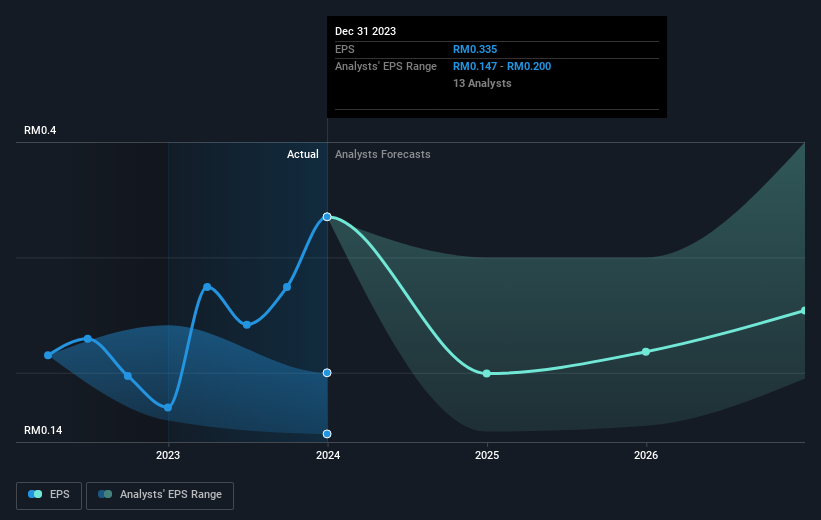Stock Analysis
- Malaysia
- /
- Healthcare Services
- /
- KLSE:IHH
Investors in IHH Healthcare Berhad (KLSE:IHH) have seen returns of 19% over the past three years

By buying an index fund, you can roughly match the market return with ease. But many of us dare to dream of bigger returns, and build a portfolio ourselves. Just take a look at IHH Healthcare Berhad (KLSE:IHH), which is up 13%, over three years, soundly beating the market decline of 1.1% (not including dividends). On the other hand, the returns haven't been quite so good recently, with shareholders up just 8.2% , including dividends .
With that in mind, it's worth seeing if the company's underlying fundamentals have been the driver of long term performance, or if there are some discrepancies.
Check out our latest analysis for IHH Healthcare Berhad
To paraphrase Benjamin Graham: Over the short term the market is a voting machine, but over the long term it's a weighing machine. One imperfect but simple way to consider how the market perception of a company has shifted is to compare the change in the earnings per share (EPS) with the share price movement.
IHH Healthcare Berhad was able to grow its EPS at 145% per year over three years, sending the share price higher. This EPS growth is higher than the 4% average annual increase in the share price. Therefore, it seems the market has moderated its expectations for growth, somewhat.
The company's earnings per share (over time) is depicted in the image below (click to see the exact numbers).

We know that IHH Healthcare Berhad has improved its bottom line over the last three years, but what does the future have in store? Take a more thorough look at IHH Healthcare Berhad's financial health with this free report on its balance sheet.
What About Dividends?
As well as measuring the share price return, investors should also consider the total shareholder return (TSR). Whereas the share price return only reflects the change in the share price, the TSR includes the value of dividends (assuming they were reinvested) and the benefit of any discounted capital raising or spin-off. It's fair to say that the TSR gives a more complete picture for stocks that pay a dividend. We note that for IHH Healthcare Berhad the TSR over the last 3 years was 19%, which is better than the share price return mentioned above. And there's no prize for guessing that the dividend payments largely explain the divergence!
A Different Perspective
IHH Healthcare Berhad shareholders gained a total return of 8.2% during the year. Unfortunately this falls short of the market return. On the bright side, that's still a gain, and it's actually better than the average return of 3% over half a decade It is possible that returns will improve along with the business fundamentals. While it is well worth considering the different impacts that market conditions can have on the share price, there are other factors that are even more important. Consider for instance, the ever-present spectre of investment risk. We've identified 1 warning sign with IHH Healthcare Berhad , and understanding them should be part of your investment process.
Of course IHH Healthcare Berhad may not be the best stock to buy. So you may wish to see this free collection of growth stocks.
Please note, the market returns quoted in this article reflect the market weighted average returns of stocks that currently trade on Malaysian exchanges.
Valuation is complex, but we're helping make it simple.
Find out whether IHH Healthcare Berhad is potentially over or undervalued by checking out our comprehensive analysis, which includes fair value estimates, risks and warnings, dividends, insider transactions and financial health.
View the Free AnalysisHave feedback on this article? Concerned about the content? Get in touch with us directly. Alternatively, email editorial-team (at) simplywallst.com.
This article by Simply Wall St is general in nature. We provide commentary based on historical data and analyst forecasts only using an unbiased methodology and our articles are not intended to be financial advice. It does not constitute a recommendation to buy or sell any stock, and does not take account of your objectives, or your financial situation. We aim to bring you long-term focused analysis driven by fundamental data. Note that our analysis may not factor in the latest price-sensitive company announcements or qualitative material. Simply Wall St has no position in any stocks mentioned.
About KLSE:IHH
IHH Healthcare Berhad
IHH Healthcare Berhad, an investment holding company, provides healthcare services in Malaysia, Singapore, Turkey, India, China, Japan, Turkey, Europe, and internationally.
Undervalued with solid track record and pays a dividend.

